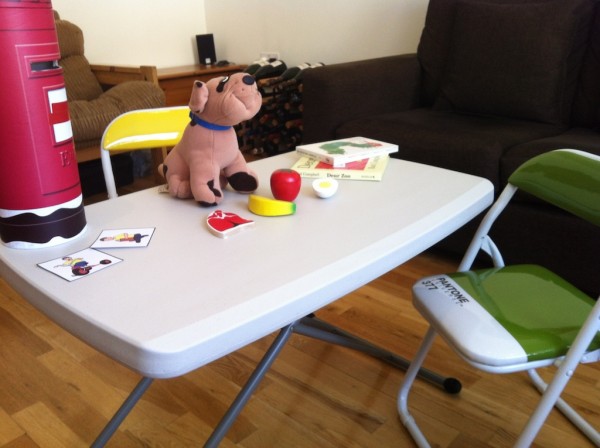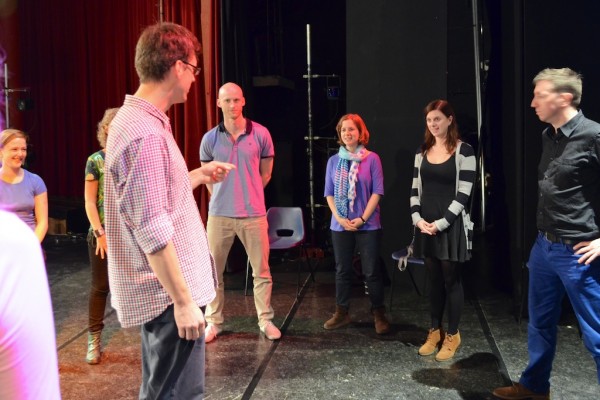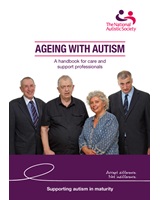As I mentioned in the last post, I use Cliniko to manage my appointments, invoices and case notes. This is the only online practice management software I’ve tried and it’s working for me. I use it on my desktop computer at home, and my phone and iPad when I’m out and about, which means I always have my client files with me. Continue reading
Tag Archives: speech and language therapy
Becoming Independent: Choosing where to work and finding a therapy room

I don’t have space to see clients at my flat. I needed to decide if I’d go and visit people, or rent a therapy room and have clients come to me. When I calculated how much time I’d spend travelling from family to family, I realised I’d only be able to see 4 or 5 clients in a day. It made more sense for me to rent a room, I’m able to book in between 6 and 8 clients a day.
There are of course advantages to seeing clients in their own home or educational setting. There are also advantages to seeing people in a distraction free, neutral space where both children and their parents can focus on the therapy session.
I work part time, so I looked for rooms I could rent by the hour or day. I’ve used 5 different therapy rooms and learnt what’s important to me, here are some things to consider. Continue reading
Becoming Independent: how to promote an independent SLT practice

People have asked me how I advertise my practice. When I ask clients how they found me about half say someone they know recommended me. Some tell me they found me via the ASLTIP directory, and the rest searched google and found my website.
Encourage Personal Recommendations
Happy clients tell their friends! I’ve worked with a former client’s next door neighbour, been contacted by a woman who said her sister’s friend suggested me, and had parents recommended me to their child’s classmates. Continue reading
Raising Awareness of Language Learning Impairments at The House of Commons

A few weeks back I found myself listening to inspiring speakers at The House of Commons. These speakers weren’t politicians or the academics who’d invited me, they were children, young people and adults with language impairments. The event was celebrating 2 years of the RALLI campaign, which aims to raise public awareness of what language learning impairments are, how to identify them and how to support people who have them. Continue reading
Webinar: Introduction to Speech and Language Therapy
Attend an Introduction to Speech and Language Therapy Webinar
Tuesday 12 August at 06:00 PM BST (view in your timezone), £45
Are you considering a career in speech and language therapy? Participate in this 90 minute webinar to learn about client needs, therapy techniques and skills. Find out if SLT suits you and complement any shadowing opportunities. This will help you to apply for SLT courses.
Through case studies you’ll learn:
- what needs clients have and several therapy approaches that work
- what core skills therapists need (and how to identify your existing skills that are relevant)
- how to approach therapists to arrange observation sessions (and other ways to get practical experience)
- how to find resources (books, blogs, videos) to learn more about speech and language therapy and prepare your application form.
You’ll also have a chance to ask questions and afterwards you’ll receive a video recording of the webinar.
Buy a ticket to the Introduction to Speech and Language Therapy webinar.
Being the client: knowing what to expect and listening to my gut
 This is the first time I’ve blogged since I had a baby 8 weeks ago. I’m delighted to be sharing my life with this tiny person, although he sure does change the landscape of my days. Spare moments are scarce, when I find them, I hop into bed for a nap!
This is the first time I’ve blogged since I had a baby 8 weeks ago. I’m delighted to be sharing my life with this tiny person, although he sure does change the landscape of my days. Spare moments are scarce, when I find them, I hop into bed for a nap!
I’ve been told by parents I’ve worked with that I didn’t understand particular things because I didn’t have children. In my foggy mental state I’ve reflected on a few things I’ve learnt as a new parent.
I’ve realised how dedicated some parents are. I’ve known families come to therapy sessions with their older child when their new baby was just days old. In those first few weeks I called it a successful day if I could shower and comb my hair. These families had a legitimate reason for cancelling sessions but they didn’t: they came along, took part, and supported their older child. Wow. Continue reading
Can I Shadow you? Pre-course clinical experience

Since setting up in independent practice I’ve had almost weekly emails from people who want to train as speech and language therapists. They explain they need to gain relevant work experience and ask if they can come and shadow me during therapy sessions with my clients. Continue reading
What influences progress in therapy?

When I caught up with my former NHS colleagues recently, they asked me how my independent practice was going. I commented that I’d never seen children make as much progress. We started unpicking possible reasons for this rapid progress, was it that:
- I see the children once a week on an ongoing basis? Or
- The parents are particularly engaged because they’re paying for the service? Or
- I’m able to tailor therapy to a child’s particular needs? Or
- A combination of all three factors? Something else entirely? Continue reading
Speech therapists can learn about collaboration, facilitation and leadership skills from other disciplines

At a recent study day (Child Talk What Works consensus event) I heard Dawn Smith, Healthcare Professionals Advisor, talk about commissioning SLT services. She suggested we tell stories about the impact our services have, with compelling headlines and concise evidence. She talked about the importance of making “effective relationships … across increasingly complex systems” and said that the services thriving under the new commissioning arrangements have “transformational leaders.” It was an interesting talk. Continue reading
Ageing with autism and managing expectations in therapy

On Wednesday evening I attended the National Autistic Society’s Ageing and Autism launch event. Francesca Happé talked about the huge gaps in the research, and outlined the things we don’t know about what happens when people with autism age. As autism was first used as a diagnostic label in 1943, the children diagnosed then are now approaching their 60s and 70s.
Saskia Baron’s brother Timothy, was one of these children. In 1961 he was diagnosed with “Childhood Psychosis” which later became known as Autism Spectrum Disorder. He is now 57 years old. Saskia talked movingly about growing up with a sibling with autism, and her worries about Timothy’s future. She described how difficult it is for Timothy to let people know when he is unhappy or in pain. More positively, she talked about how she’s observed that Timothy is still able to learn new skills. Saskia agrees that early intervention is important, however, she feels it’s not justified to remove therapeutic resources in late childhood or early adulthood, as the door to learning is still open.
My clients with autism are between 3 and 6 years old, they’ll be approaching old age in 60 years! Saskia’s presentation made me think about two things, how can I support the siblings of my clients? And how can I teach my clients ways to express their pain?
This week I also had a wonderful conversation with Keena Cummins. I’m using her VERVE technique with several families and was thinking about how to manage parents’ expectations. All the children have been making great progress due to the efforts of their skilled and perceptive parents, yet these parents often express frustration that their children aren’t using more words. Keena suggested I’m clear about what I want parents to focus on:
“During these therapy sessions I want you to focus on his playing, I’ll worry about his talking. I want you to think about how you’re supporting him to play, explore the toys, and try out his ideas. We’ll be thinking about his words later.”
This makes sense to me, I’ll try it out this week.
